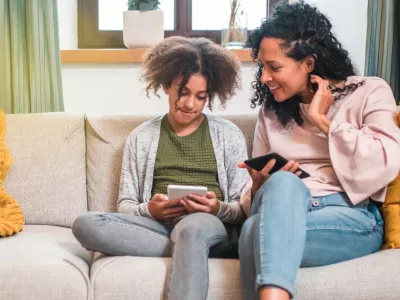Beyond social media guilt: support kids and stress less with positive parenting

Imagine your family navigating social media challenges with confidence and connection.
You're setting boundaries calmly. Your children feel heard and supported. Screen time is balanced and not dominating your family life.
What would that be like for you? Compared with now?
It’s perfectly natural to feel worried when we’re hearing daily about the harmful impacts of social media on children. Governments are introducing age restrictions, yet the weight of responsibility for children’s social media access still rests largely with parents and caregivers.
So, finding the right balance for your family—even getting started on it—can be a lot. In fact, our most recent parenting survey showed that social media and screen time are the leading cause of conflict in families.
The good news is that there are some simple steps you can take to slowly, and realistically, adjust your routine and build on what works for you and your family.
1. Break free from social media guilt and stress
Parents can feel stressed or even guilty about setting social media restrictions. Our children can give us messages that we are ‘mean’ or ‘out-of-touch’, or that they rely on social media to maintain friends. Feeling stressed or guilty is normal and shows that you care deeply and want to keep kids safe. What if you used these feelings as a prompt for positive action?
To begin with, try not to get stuck in a guilt-stress spiral. When you feel guilty, you might spend less time on self-care. Supporting the kids with screen-free alternatives might get harder, and then you might feel more guilty and stressed. If that sounds familiar, you could try catching those negative thoughts and turning them around:
- ‘I’ve got this. Progress, not perfection.’
- ‘I’m not the only one dealing with this.’
- ‘Worrying doesn’t help, what can I do instead?’
You’ll see that making a start can soon reduce the anxiety and put you and your whole family in a better, more positive frame of mind.
2. Use activities and adjust your environment to reduce social media
Many parents and caregivers are getting creative to reduce children’s screen time and social media use. It could be a family digital detox, or reverting to landlines, flip and dumb phones that don’t have apps. Don’t forget to ask friends, teachers and other parents about their own approaches. There’s power in working together.
Think about alternatives to social media that could work for your own child and family. What do your children want to use it for? Are there other ways for them to connect with their friends? Are they bored, avoiding responsibilities or maybe seeking connection and peer validation. Look for interesting family, social and outdoor activities that help make real life more enjoyable than screen time.
3. Invest in device-free time for stronger connections
Children feel more heard and valued when we’re fully present, especially when they come to us. Child-led moments are like rocket fuel for kids’ emotional regulation skills and help to grow their bond with you.
Of course, one size does not fit all. This is about your family and it’s better to find what’s right for you in the light of your children’s ages and your family values. But the upsides of reducing screen time are universal. It could mean more family moments—whether that’s playing board games, having a chat or cooking together.
Phone-free time creates space for warmer, more responsive interactions. Research shows that close parent-child relationships are one of the biggest protectors of children’s mental health both now, and in the future.
4. Create a family culture that’s striving for digital balance
Think about how your kids view your social media usage. Are you following the family rules? It can be a real challenge to be a positive role model when social media is your downtime go-to.
If you do happen to be struggling to find that balance, it’s a great conversation to have with older kids. Open and honest chats can play a big part in creating a safe, judgement-free home environment where children can be confident about sharing their views.
The upshot is that when you take care of your own digital wellbeing, there's a powerful flow-on effect. Children benefit not only from calmer interactions but also by learning what healthy digital boundaries look like for themselves.
5. Expect pushback – your calm supports their emotional regulation
It’s normal for children and teenagers to feel strong emotions if you’re reducing or removing social media apps. Acknowledge kids’ feelings of disappointment or anger. While big emotions can feel overwhelming, consistent boundaries help kids learn self-control. Take a moment for yourself if you need to. (If you don’t have agreed family social media rules, you could read our parenting guide to creating them.)
When you stick to agreed rules calmly and kindly, children learn that pestering won't change the outcome. Learning to handle disappointment is part of their emotional development. Reassure them that you’re there to support them, no matter what.
Remember, it’s completely normal to feel uncertain about social media. You’re not expected to be a social media expert. You’re the expert on your child. Be gentle with yourself. Parenting in the social media age is stressful for everyone, and small positive changes matter more than getting everything right immediately.
Social media: where to seek help
For more parenting strategies, you might like to check out our range of online positive parenting programs or speak to your health professional.
- For families of children aged 12 and under, Triple P Online can help.
- For support with teens, you could try Teen Triple P Online.
References
- Nagata, J.M., Paul, A., Yen, F. et al. (2025) Associations between media parenting practices and early adolescent screen use. Pediatr Res, 97, 403–410. https://doi.org/10.1038/s41390-024-03243-y

